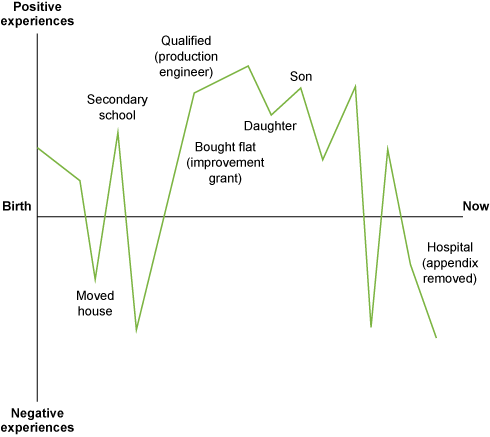1 Who am I?
Activities 1 and 2 will help you to develop an overview of your life so far, and to consider how your early history contributed to it.
Activity 1
Part 1
In this activity you’re going to use the template for this activity in the resource pack [Tip: hold Ctrl and click a link to open it in a new tab. (Hide tip)] to draw a ‘lifeline’. This lifeline can help you to:
- think about the pattern of your life
- gather insights that can influence your future choices
- discover aspects of yourself that you might want to develop or change.
Using Figure 1 as a guide, note down key life events such as education, work, interests, marriage, children and so on, to show the high and low points at different times of your life.
For some people, the lifeline exercise can result in a lot of emotions coming to the surface as you review your experiences. You may find it useful to talk through any difficult feelings that arise with someone you trust.
Part 2
When you’ve drawn a lifeline that reflects your key experiences, think about the feelings aroused by each experience and then answer these questions, noting down any thoughts or ideas that occur to you:
- What does the lifeline say about you and how you’ve lived your life?
- Are there recognisable themes that have run through your life?
- Is the pattern generally up or down? Is it steady or changeable? What sorts of incidents were associated with the highs and lows?
- Are the highs generally associated with your own choices and the lows with the unexpected? Are there some experiences you cope with easily and others that really throw you?
- Are there any lessons to be learned?
For example, this activity revealed to one person that all her high points were associated with praise from others and her low points with geographical moves. Another noted that all his positive job changes followed disappointments in his private life, and he saw that each disappointment motivated him towards a change that offered opportunities. A third recognised someone else as consistently acting as a mentor.
Would someone who knows you well have drawn your lifeline differently? It might be an interesting exercise to ask at least one other person to draw your lifeline to compare their view with yours.
Activity 2
Part 1
This activity seeks to spark some more detailed memories from your childhood and teenage years. Make notes in response to the prompts given below. The activity may make you want to amend or add to your lifeline, as you consider your experiences in more depth.
- Family influences: if applicable, say something about any occupational influences on you. For instance, was one of your parents a mechanic or another a teacher?
- Early childhood: what do you remember about your early childhood? For example, the area and house you lived in, family lifestyle, activities you participated in, experiences you had, what your parents expected of you, your role in the family.
- Schooling: list the schools you went to, with dates, the subjects you were good at and enjoyed, how you got on with other children, how your teachers saw you, how you saw your teachers, and any school sports or activities you took part in.
- Teenage years: what activities were you good at or did you enjoy? How did your friends see you? What were you like as a teenager? What did you want to be?
- Any further education or training: what did you do? How did you choose it? How did you get on?
Part 2
Now spend some time considering what your notes say about you – what you’re like, and why, and how you arrived at where you are today. You may see themes appearing, such as strong aspects of your personality or particular talents and interests. Maybe you had various abilities but developed one rather than another – sporting ability rather than artistic talent, perhaps. Looking back, could you have made different choices? Make a note of any insights you’ve gained.
You've now completed Section 1 - well done! We hope that you have found your study useful and are motivated to carry on with the course. Remember, if you pass the quiz at the end of each block you will be able to download a badge as evidence of your learning and you can download a statement of participation that recognises your completion of the whole course.

